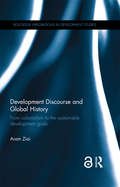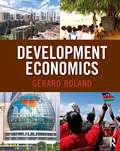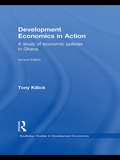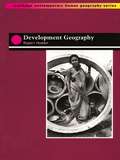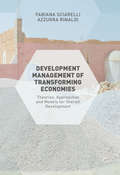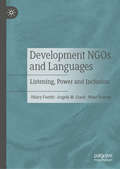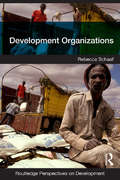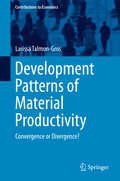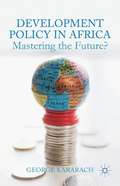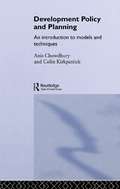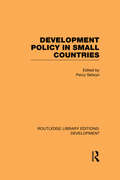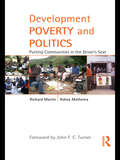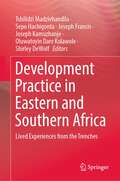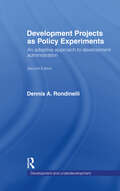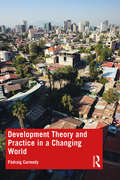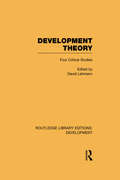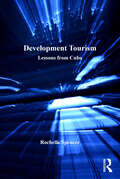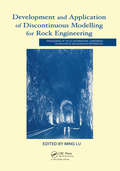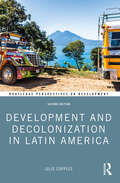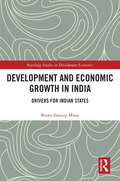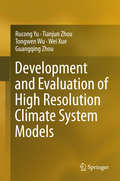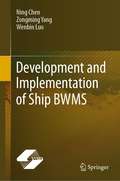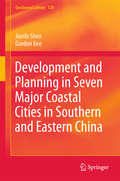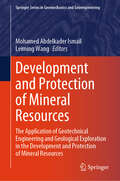- Table View
- List View
Development Discourse and Global History: From colonialism to the sustainable development goals (Routledge Explorations in Development Studies)
by Aram ZiaiThe manner in which people have been talking and writing about ‘development’ and the rules according to which they have done so have evolved over time. Development Discourse and Global History uses the archaeological and genealogical methods of Michel Foucault to trace the origins of development discourse back to late colonialism and notes the significant discontinuities that led to the establishment of a new discourse and its accompanying industry. This book goes on to describe the contestations, appropriations and transformations of the concept. It shows how some of the trends in development discourse since the crisis of the 1980s – the emphasis on participation and ownership, sustainable development and free markets – are incompatible with the original rules and thus lead to serious contradictions. The Eurocentric, authoritarian and depoliticizing elements in development discourse are uncovered, whilst still recognizing its progressive appropriations. The author concludes by analysing the old and new features of development discourse which can be found in the debate on Sustainable Development Goals and discussing the contribution of discourse analysis to development studies. This book is aimed at researchers and students in development studies, global history and discourse analysis as well as an interdisciplinary audience from international relations, political science, sociology, geography, anthropology, language and literary studies.
Development Economics
by Gérard RolandGerard Roland's new text, Development Economics, is the first undergraduate text to recognize the role of institutions in understanding development and growth. Through a series of chapters devoted to specific sets of institutions, Roland examines the effects of institutions on growth, property rights, market development, and the delivery of public goods and services and focuses. With the most comprehensive and up to date treatment of institutions on development, Roland explores the important questions of why some countries develop faster than others and why some fail while others are successful.
Development Economics
by Gérard RolandGerard Roland's new text, Development Economics, is the first undergraduate text to recognize the role of institutions in understanding development and growth. Through a series of chapters devoted to specific sets of institutions, Roland examines the effects of institutions on growth, property rights, market development, and the delivery of public goods and services and focuses. With the most comprehensive and up to date treatment of institutions on development, Roland explores the important questions of why some countries develop faster than others and why some fail while others are successful.
Development Economics in Action: A Study of Economic Policies in Ghana (Routledge Studies In Development Economics Ser. #79)
by Tony KillickFirst published in 1978, Development Economics in Action is a renowned study of policies in Ghana, one of Africa’s most closely watched economies. In this new edition three additional chapters provide a detailed account of 1978-2008.
Development Geography
by Rupert HodderDevelopment Geography is an informative and vibrant introductory level text, with a wealth of contrasting case-studies and illustrations. Written to stimulate critical thought and discussion about development, it does not assume any clear-cut distinction between 'developed' and 'developing' parts of the world. Case-studies highlight the problems and possible solutions at local, national and international scales. These include:* food production in Senegal* Disney in China* Hurricane Mitch in Honduras* corruption in Bulgaria* further studies from Russia, Bangladesh and Vietnam.Development Geography is the fifth book to be published in the popular modular text series Routledge Contemporary Human Geography.
Development Management of Transforming Economies
by Fabiana Sciarelli Azzurra RinaldiThis insightful book offers a new and innovative tool in the study of development. The authors propose 'The Overall Development Model' which provides a strategy for long-term, sustainable and adaptable development for countries around the globe. Starting with a comprehensive study into what development is and how it is achieved, Development Management of Transforming Economies critically analyzes current development schemes within transforming economies and examines their various actors both international and local, public and private. It examines the implementation of health, education and economic strategies of countries in Africa and Asia that have either undergone a development process, experienced slow but steady progress, or are just beginning to pursue a development strategy. In considering human development as a whole, the authors assert a new method of development that includes the developing population, and highlights the need for countries to define their own unique development process.
Development NGOs and Languages: Listening, Power and Inclusion
by Hilary Footitt Angela M. Crack Wine TesseurThis book addresses, for the first time, the question of how development NGOs attempt to 'listen' to communities in linguistically diverse environments. NGOs are under increasing pressure to demonstrate that they 'listen' to the people and communities that they are trying to serve, but this can be an immensely challenging task where there are significant language and cultural differences. However, until now, there has been no systematic study of the role of foreign languages in development work. The authors present findings based on interviews with a wide range of NGO staff and government officials, NGO archives, and observations of NGO-community interaction in country case studies. They suggest ways in which NGOs can reform their language policies to listen to the recipients of aid more effectively.
Development Organizations (Routledge Perspectives on Development)
by Rebecca SchaafContinuing debates over the meaning of development and awareness of the persistence of poverty have resulted in increasing concern over how to ‘do’ development. There are growing numbers of development organizations, undertaking different activities, at different scales, with different motivations, and differing levels of success. It is necessary to identify and evaluate these varied organizations, in order to recognize their successes and failures. Development Organizations is the first introductory text to focus specifically on the variety of organizations involved in development policy and practice. It explores the range and role of organizations, including community-based organizations and civil society actors, international non-governmental organizations, state and other national-based actors, global forms of governance, international financial institutions and transnational corporations. The historical and contemporary role of each of these actors is considered, with analysis of complex theoretical debates surrounding their existence and their activities. The book also explores the political and contested nature of development activities promoted by these organizations, and their effects on society, the economy and the environment. These issues are also considered in context of the Millennium Development Goals; the agenda which currently impacts on the operation and outcomes of the broad range of development organizations. This invaluable text is richly complimented throughout with case studies to help illustrate the operations of development organizations; from the impact of multinational oil companies in the Niger delta to the impact of IMF reforms in Latin America and the Caribbean. This clearly written and user friendly text contains a wealth of features to assist student learning, including start of chapter learning outcomes, and end of chapter summaries, discussion topics, and suggestions for further reading and relevant websites.
Development Patterns of Material Productivity
by Larissa Talmon-GrosIncreasing concerns regarding the world's natural resources and sustainability continue to be a major issue for global development. As a result several political initiatives and strategies for green or resource-efficient growth both on national and international levels have been proposed. A core element of these initiatives is the promotion of an increase of resource or material productivity. This dissertation examines material productivity developments in the OECD and BRICS countries between 1980 and 2008. By applying the concept of convergence stemming from economic growth theory to material productivity the analysis provides insights into both aspects: material productivity developments in general as well potentials for accelerated improvements in material productivity which consequently may allow a reduction of material use globally. The results of the convergence analysis underline the importance of policy-making with regard to technology and innovation policy enabling the production of resource-efficient products and services as well as technology transfer and diffusion.
Development Policy In Africa
by George KararachThe author investigates a number of topical issues for Africa's development: migration and population, macroeconomic policy, climate change, food security, energy security, infrastructure, regional integration and the importance of innovations, and research and development. The book covers subjects such as economy and politics, development financing, trans-boundary governance, public service delivery and inclusive growth. With a clear focus on the capacity dimension, Kararach proposes critical policy and action-oriented recommendations on how to overcome both present and future emergencies in Africa.
Development Policy and Planning: An Introduction to Models and Techniques
by Anis Chowdhury Colin KirkpatrickReorientation from economic controls to a market-based approach led to significant changes in the economic policy of developing countries in the 1980s. Yet, with governments continuing to exercise economic management to accelerate growth beyond that achieved by market forces, techniques and models of development planning are still an integral feature of development policy management. Development Policy and Planning provides a non-technical explanation of the main techniques and models used for economic policy formulation. Each technique is illustrated in application through practical examples.
Development Policy in Small Countries (Routledge Library Editions: Development)
by Percy SelwynFirst published in 1975, the main emphasis of this reissued collection is on the various aspects of dependence to which small countries as such are subject, and the policy options in the political and economic field which are open to them.
Development Poverty and Politics: Putting Communities in the Driver’s Seat (Routledge Studies in Development and Society)
by Richard Martin Ashna MathemaTop down . . . bottom up . . . what works? This book explores development from theperspective of the poor. Who are they? What lives do they live? What matters tothem? And most importantly, what can they do about it? Martin and Mathema debate how people can be given legitimate control of theirown environment, and how governments can work with them. How do communitiesand conditions drive behavior? What interventions are appropriate and how can weapproach development imaginatively? This is not about usurping governance – but revisiting structures that the developedworld has come to accept, and placing the power of decision in the hands of thepeople it affects. Nor it is about money . . . it’s about people, and about how we can make our worldwork for everyone.
Development Practice in Eastern and Southern Africa: Lived Experiences from the Trenches
by Sepo Hachigonta Tshilidzi Madzivhandila Joseph Francis Joseph Kamuzhanje Oluwatoyin Dare Kolawole Shirley DeWolfThis book is a rare collection of reflective and reflexive stories that reveal how seasoned academics, agents of grassroots social change, leaders and journalists transformed and shaped the development landscape in eastern and southern Africa. Whereas practical experiences are crucial assets and resources for shaping the academic environment and development practice landscape, most of the existing literature recommended as key learning materials in tertiary institutions is rarely in synch with the practical realities of development practice. The shared individual lived experiences from academic endeavours and fieldwork provide hands-on tools for students and emerging practitioners who might be involved in or are currently facilitating development work. The thrust of the book, therefore, is to demystify the day-to-day experiences of development practitioners while contributing to learning pathways or strategies for achieving viable solutions to the myriad of challenges, which grassroots communities face. The relevance of the book as a crucial resource for students pursuing development-oriented degree programmes in colleges and universities is obvious. Without any doubt, the compilation will be handy in the implementation of diverse development-oriented transformation agenda at academic, programming and policy levels.
Development Projects as Policy Experiments: An Adaptive Approach to Development Administration (Development and Underdevelopment Series)
by Dennis A. RondinelliInternational assistance programmes for developing countries are in urgent need of revision. Continuous testing and verification is required if development activity is to cope effectively with the uncertainty and complexity of the development process. This examines the alternatives and offers an approach which focuses on strategic planning, administrative procedures that facilitate innovation, responsiveness and experimentation, and on decision-making processes that join learning with action. A useful text for academics and practitioners in development studies, geography and sociology.
Development Theory and Practice in a Changing World
by Pádraig CarmodyTaking a critical and historical view, this text explores the theory and changing practice of international development. It provides an overview of how the field has evolved and the concrete impacts of this on the ground on the lives of people in the Global South. Development Theory and Practice in a Changing World covers the major theories of development, such as modernisation and dependency, in addition to anti-development theories such as post-modernism and decoloniality. It examines the changing nature of immanent (structural) conditions of development in addition to the main attempts to steer them (imminent development). The book suggests that the era of development as a hegemonic idea and practice may be coming to an end, at the same time as it appears to have achieved its apogee in the Sustainable Development Goals as a result of the rise of ultra-nationalism around the world, the increasing importance of securitisation and the existential threat posed by climate change. Whether development can or should survive as a concept is interrogated in the book. This book offers a fresh and updated take on the past 60 years of development and is essential reading for advanced undergraduate students in areas of development, geography, international studies, political science, economics and sociology.
Development Theory: Four Critical Studies (Routledge Library Editions: Development)
by David LehmannThe studies in this book, first published in 1979, offer an all-encompassing contemporary critique of the sociology, politics and economics of development as they are ‘conventionally’ taught and disseminated. They also seek to outline the beginnings of a new approach, while not sparing from criticism the simplistic of contemporary radical theories. The reissue will prove of significant interest to the teaching of development studies at both undergraduate and post-graduate levels.
Development Tourism: Lessons from Cuba (New Directions in Tourism Analysis)
by Rochelle SpencerTourism in Cuba - described by Fidel Castro as 'the evil we have to have' - has been regarded both with ambivalence, and as a crucial aspect of development and poverty alleviation. The result is a remarkable approach to tourism, one which often compels tourists to become agents of development through solidarity. Drawing on her experiences of working in an NGO in Cuba, the author uses a multi-sited ethnographic approach to investigate tourism motivations and experiences, and to examine the very nature of development. Her analysis covers a wide range of issues including social change, globalization, social theory, and sustainability. Also discussed is the way in which tourism in Cuba relates to broader debates surrounding transformation, capacity building, social action and solidarity.
Development and Application of Discontinuous Modelling for Rock Engineering: Proceedings of the 6th International Conference ICADD-6, Trondheim, Norway, 5-8 October 2003
by Ming LuThe thirty papers published in this book represent the latest developments in Discontinuous Deformation Analysis (DDA). The Numerical Manifold Method (NMM) and other numerical methods and their applications are also covered, as are the theoretical contributions of 3D DDA, modelling and visualization of 3D joint systems, and high-order NMM. Applications of these advances include the stability of underground works, rock slopes and boreholes.
Development and Decolonization in Latin America (Routledge Perspectives on Development)
by Julie CupplesWritten in an accessible language, this book is a fully updated and revised edition of Latin American Development, a text that provides a comprehensive introduction to Latin American development in the twenty-first century and is anchored in decolonial theory and other critical approaches. This new edition has been revised and updated in a way that takes into account recent changes in political leadership, the retreat of the Pink Tide, the Colombian peace accords, new forms of political and territorial mobilization, the intensification of extractivism, murders of environmental defenders, major disasters, and the new contours of feminist and anti-patriarchal struggles. It features new chapters on decolonial theory, Latin America in the world, disastrous development, Afrodescendant struggles, and the Latin American city. The book emphasizes political, economic, social, cultural, and environmental dimensions of development and considers key challenges facing the region and the diverse ways in which its people are responding, as well as providing analysis of the ways in which such challenges and responses can be theorized. It explores the region’s historical trajectories, the implementation and rejection of the neoliberal model, and the role played by diverse social movements. It is an indispensable resource for students and university lecturers and professors in development studies, Latin American studies, geography, anthropology, sociology, political science, economics, and cultural studies. In addition, it provides an invaluable introduction to the region for journalists and development practitioners.
Development and Economic Growth in India: Drivers for Indian States (Routledge Studies in Development Economics)
by Biswa Swarup MisraNotwithstanding the improved growth performance of India, development disparity across its states has widened in the first two decades of the 21st century. This book examines development drivers of Indian states and what the necessary course corrections could be to achieve balanced regional growth. The book begins with a discussion on the evolution of growth and inequality across the states and delves into decomposing growth. It looks at three broad themes which are decomposition of growth and determinants of TFP, impact of Infrastructure on growth and inequality, and the institutional dimension of growth and explains why they are pivotal for sustainable growth in Indian states. This book will be a useful reference to those interested in understanding growth and inequality in India.
Development and Evaluation of High Resolution Climate System Models
by Rucong Yu Tianjun Zhou Tongwen Wu Wei Xue Guangqing ZhouThis book is based on the project "Development and Validation of High Resolution Climate System Models" with the support of the National Key Basic Research Project under grant No. 2010CB951900. It demonstrates the major advances in the development of new, dynamical Atmospheric General Circulation Model (AGCM) and Ocean General Circulation Model (OGCM) cores that are suitable for high resolution modeling, the improvement of model physics, and the design of a flexible, multi-model ensemble coupling framework. It is a useful reference for graduate students, researchers and professionals working in the related areas of climate modeling and climate change. Prof. Rucong Yu works at the China Meteorological Administration; Prof. Tianjun Zhou works at LASG, the Institute of Atmospheric Physics, Chinese Academy of Sciences; Tongwen Wu works at Beijing Climate Center, China Meteorological Administration; Associate Prof. Wei Xue works at the Department of Computer Science and Technology, Tsinghua University; Prof. Guangqing Zhou works at the Institute of Atmospheric Physics (IAP), Chinese Academy of Sciences.
Development and Implementation of Ship BWMS
by Zongming Yang Ning Chen Wenbin LuoThis book introduces the components and principles of the common ballast management systems. The working principles of different filtration, cleaning and sterilizing equipment are also introduced. The calculation norm of the construction design and the calculation method of simulation are described. Besides, different aspects of system management are analyzed. The principle of various detecting sensors, the hardware of control system and the design method of human–computer interface are respectively introduced. Last but not least, the maintenance and management of ballast water management system are described, mainly the maintenance and management of key components which composes the system.
Development and Planning in Seven Major Coastal Cities in Southern and Eastern China
by Jianfa Shen Gordon KeeThis book analyzes the recent growth of Guangzhou, Shenzhen, Fuzhou, Shanghai, Hangzhou, Nanjing, and Hong Kong, seven major Chinese coastal cities. The authors detail theoretical mechanisms, spatial and non-spatial models of development, all while exploring possible directions to sustainability. They also look at how these cities have developed over the last 30 years, from the late 1970s to the 21st century. Each has its own unique background, regional and national positions, advantages, and functions. Using diversified approaches and measurements for each city, the authors argue that structural changes are necessary to achieve much needed sustainable development. The book covers developmental issues such as the regaining of central city and global city statuses, the role of governments in steering development, and achieving goals through mega projects, urban competitiveness, positioning, and branding. Including varied assessment and intense suggestions for structural changes, this book addresses core concerns for the sustainable growth of these metropolises. A valuable book for students, researchers and policy makers.
Development and Protection of Mineral Resources: The Application of Geotechnical Engineering and Geological Exploration in the Development and Protection of Mineral Resources (Springer Series in Geomechanics and Geoengineering)
by Mohamed Abdelkader Ismail Leiming WangThis book comprises papers that showcase recent advancements and applications of innovative technologies in mining, offering theoretical insights and practical references for industry professionals. The 8th International Conference on Mineral Resources, Geotechnology and Geological Exploration (MRGGE 2024) was successfully held on June 14-16, 2024, in Shijiazhuang, China. This conference aims to address the dual challenge of providing essential mineral resources while ensuring environmental protection and sustainability in the mining industry. The proceedings encompass a wide range of topics, including ecological restoration of mines, geotechnical engineering, cleaning materials, geological exploration, and energy storage. The intended readership includes engineers, consultants, managers, academics, scientists, and government officials actively engaged in the mineral industry, serving as a valuable resource for promoting sustainable practices and advancing the field.
